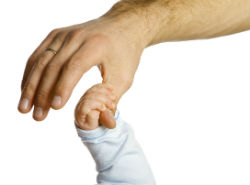How to Deal With Losing a Baby
When a baby dies in the NICU, there is obviously tremendous grief felt by the family and the medical team. Great amounts of emotional and physical energy have been invested in your preemie, and it is a terrible tragedy when the story doesn’t end well. Many parents have shared with me their thoughts after losing a baby. Here are some of the things that were particularly meaningful to their grieving process and some things that they were unprepared for.
Be With Your Baby, Even Hold Him, While He is Dying
You probably don’t feel like you can handle watching your baby die, but parents who have been through this have said that it was very important for them to do this. If you stay with your baby, holding and comforting him, you will know that you did everything possible to make his life full of love. A common scenario is that after weeks of high-tech intensive care with lots of noisy machines and tubes attached to your baby, it becomes clear that the battle is lost, and the decision to withdraw life-support is made. This can then be a peaceful time for saying goodbye with no beeping monitor alarms. Some parents have felt a sense of relief to see their baby at peace since they had such a struggle during their stay in the NICU.
Some parents have shared that they criticized themselves later on for choosing not to be with their baby.
Collect Some Mementos of Your Baby
After losing a baby you might be too grief-stricken to think about keeping some of their things, but it is important. You will eventually realize, maybe weeks or months later, how meaningful these things can be. A picture, a hat or a stuffed animal from his incubator will help keep his memory alive. If you need to, ask a friend or one of the nurses to collect some things for you. Even if your child’s life was brief, the memories of his life will last forever, and having some tangible items may be very important to you in the future.
Be Sure He Has a Name
Even if your baby doesn’t survive more than a few hours after his premature birth, it is important that he have a name. This will help give your baby an identity, and it will be comforting to you when loved ones refer to him by name. A few months ago, my wife’s third pregnancy ended with a late miscarriage, and we have since found it very meaningful to use his name when we talk about him.
Invite Friends and Family to the Funeral
Even though most of the people in your life never got a chance to meet your baby, you will find it comforting to have your loved-ones with you during this time. The funeral will be a good time for public recognition of your baby’s life. Sharing the memories of your child’s life with some friends and family will give you more of a connection with your baby in the years to come.
What About an Autopsy After Losing a Baby?
You will probably be asked if an autopsy can be performed after losing a baby. You can decide against this if you wish, and if you are not sure, ask for more time before making a decision. Here are a few issues to consider in your decision. An autopsy can give you some definite answers about why your child died. This can be helpful to you in the future in putting closure on your child’s life. Also, the information gained from autopsies has helped doctors better understand the problems of prematurity and has led to better care for preemies. Parents often feel good about helping preemies in the future. An autopsy will not disfigure your baby, and you can still have an open casket funeral if you wish. The autopsy can also be done very quickly and should not interfere with the planning of the funeral.
Managing Your Grief
Wounds heal. Scars remain. Life goes on. To grieve over losing a baby in a healthy way, maintain a healthy connection with your infant while dealing with the loss. You may also need to call upon many resources, both personal and professional, for help. While there is no magic formula that fits everyone, there are time-tested ways of growing while grieving that many parents have found useful.
Get Into Your Grief, Not Out of It
After losing a baby, parents are often urged to keep busy, to immerse themselves in their work, to have another baby quickly – to escape the grief somehow. This usually doesn’t work. Your baby will always be part of your life, and you must acknowledge this fully or the hurt will continue to fester underneath a controlled façade. Healthy grieving means getting in touch with your feelings, mourning as you need to mourn and learning to live with memories that still live in your home.
Take Good Physical Care of Yourself
Remember grieving depresses the mind and the body. You may not want to eat, drink or exercise, but you need to. Be sure to drink a lot of fluids to keep yourself from getting dehydrated, as dehydration aggravates depression. You may have to force yourself into an exercise routine, perhaps the ritual of a half-hour morning walk; exercise will help your daily mood. Depression diminishes your appetite but you owe it to yourself to nourish your body.
Write Your Grief
Use your talents to handle grief after losing a baby. If you have a flair for writing, compose poems if that helps. If you have musical talent, compose songs. Poems are very therapeutic for the writer and the listener, especially during hard times or on special days, when grief may be more difficult to handle.
Get Help After Losing a Baby
After losing a baby, seek the comfort of family and friends, or get professional help if you need to. There are support groups available, the NICU staff probably has some local connections for you. There are a number of books that are solely devoted to dealing with the loss of a baby. One such title is “Empty Cradle, Broken Heart: Surviving the Death of Your Baby” (Fulcrum Publishing, 1996, Golden CO). Another good resource is the SHARE Pregnancy and Infant Loss Support, Inc. National Office, http://nationalshare.org.


